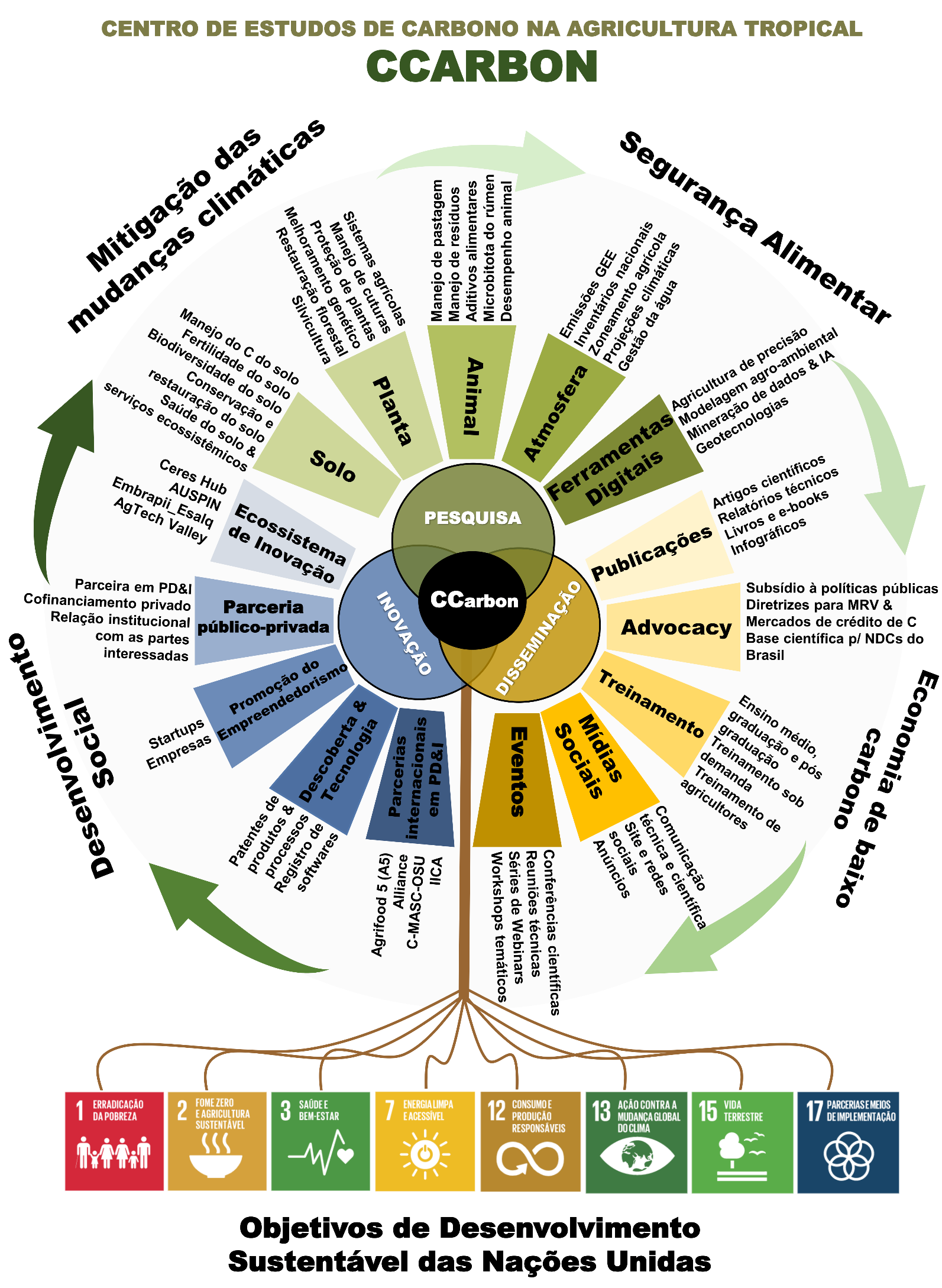BV-FAPESP: research projects supported in this Center
CCARBON in the Media: news about the Center
Brazil is one of the world's largest producers and exporters of food, feed, fiber and (bio)fuels. Estimates indicated that the country would need to increase its food production by 40 percent to meet global demand by 2050. Meanwhile, tropical agricultural systems must contribute to carbon sequestration (C), reduce greenhouse gas emissions, and consequently mitigate climate change. Therefore, the challenge is to increase agricultural production by reconciling environmental, social and economic sustainability.
In this context, the Center for Carbon Research in Tropical Agriculture (CCARBON) was created, based at USP/ESALQ and linked to the Rectory of the University of São Paulo. CCARBON was approved by the Program of Research, Diffusion and Innovation Centers (RIDC) of the São Paulo Research Foundation (FAPESP).
CCARBON's mission is to develop innovative solutions and strategies in sustainable, carbon-based tropical agriculture to mitigate climate change and improve living standards and conditions. Our vision is to be recognized as a world-class center, leader in low-C tropical agriculture and human resource qualification through research, innovation and outreach activities.
The main objectives of CCARBON are to generate knowledge, technology, innovation, human resource training and dissemination of carbon-based solutions for tropical agricultural systems and to reconcile the growing demand for food, fiber and energy with sustainability (environmental, economic and social). Our world-class research center will identify key challenges and implement solutions to increase sustainable agri-food production of tropical agricultural systems (with a focus on annual crops; i.e. soybeans, corn, cotton, cover crops, sugarcane, pastures, integrated systems such as agriculture-livestock-forestry and agroforestry programs, and forestry/ecological restoration), reducing GHG emissions, and increasing C sequestration through practices of low-carbon agriculture management. To fulfill our mission, we have established the main scientific challenges to be faced during 11 years (and beyond) the development of CCARBON.
To achieve CCARBON's objectives, strategic, multidisciplinary and innovative lines of research will cover five major areas: soil, plant, animal, atmosphere and digital tools. The center will also be embedded in an innovation ecosystem to support discoveries and new technologies through institutional public-private partnerships. We design multiple strategies for the active dissemination of knowledge and innovations, contributing to farmers and stakeholders to adopt more sustainable practices, as well as making the population aware of the relevance of the theme and supporting the development of public policies. We expect our research center to identify key challenges, develop and implement solutions to increase food, fiber and sustainable (bio)energy production in tropical ecosystems. The results will pave the way for a low-C economy and promote sustainable social development for decades to come.



2025-08-20
Countries such as Colombia and Venezuela lead the way in terms of the extent of healthy soils, while regions such as the Brazilian Northeast, northern Mexico and parts of Chile and Argentina face the greatest challenges. The data can guide public policies for conservation.
2024-05-29
Today’s key issues, such as artificial intelligence, climate change, cancer and Brazilian institutions, will be the focus of inter-institutional and multidisciplinary teaching and research; the new organization gives groups more autonomy and agility.
2023-12-06
The Center for Carbon Research in Tropical Agriculture (CCARBON) is a Research, Innovation and Dissemination Center (RIDC) supported by FAPESP and hosted by the University of São Paulo’s Luiz de Queiroz College of Agriculture (ESALQ-USP). It was officially launched on November 17 and aims to make food, fiber and energy productivity part of the solution to the climate crisis.